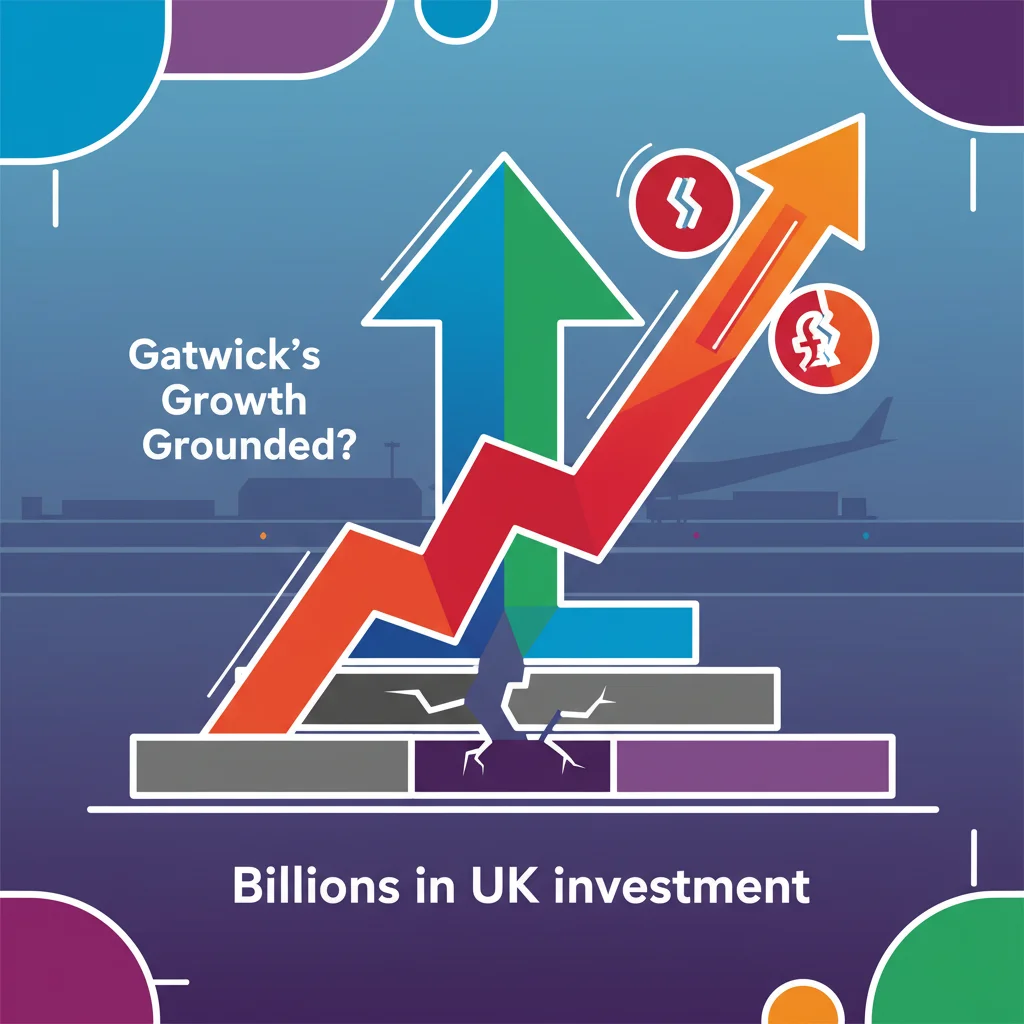
Gatwick’s Growth Grounded? How a 300% Tax Hike Threatens Billions in UK Investment
In the world of high-stakes finance and national infrastructure, stability is the bedrock upon which multi-billion-pound projects are built. Investors, particularly those with long-term horizons, prize predictability above almost all else. A sudden, seismic shift in the fiscal landscape can send shockwaves through boardrooms, jeopardizing not just a single project, but a nation’s reputation as a safe harbour for capital. This is the drama currently unfolding at London’s Gatwick Airport, where a proposed 300% increase in business rates threatens to ground a multi-billion-pound investment plan, including a much-needed new runway.
The situation presents a critical stress test for the UK’s post-Brexit economic strategy. At a time when the government is eager to project an image of being “open for business,” this move by the Valuation Office Agency (VOA) sends a potentially chilling message to global investors. It raises fundamental questions about the UK’s regulatory environment, the future of its infrastructure, and the delicate balance between public revenue generation and private sector growth. For finance professionals, business leaders, and anyone with an interest in the health of the UK economy, the Gatwick case is a microcosm of the larger challenges ahead.
The £30 Million Problem: Unpacking the Business Rates Bombshell
At the heart of this conflict is a proposed revaluation of business rates—a tax on properties used for commercial purposes. According to a report by the Financial Times, the VOA, an executive agency of HMRC, has recommended that Gatwick’s rateable value be increased to a level that would see its annual tax bill skyrocket from approximately £30 million to a staggering £120 million. This isn’t a minor adjustment; it’s a 300% surge that would fundamentally alter the airport’s operating economics.
Business rates are a significant operational cost for capital-intensive industries like aviation. They are calculated based on the “rateable value” of a property, which is essentially its estimated open market rental value. These values are periodically reassessed to reflect changes in the property market. However, an increase of this magnitude is exceptional and has, understandably, been met with alarm by Gatwick’s leadership. The airport, which is majority-owned by the French infrastructure group Vinci, has warned that such a punitive increase would force a complete re-evaluation of its ambitious investment pipeline.
This isn’t just an accounting issue; it’s a direct threat to strategic growth. The planned investment, estimated to be in the billions, includes bringing the airport’s northern runway into routine use—a project that would significantly boost capacity, enhance the UK’s global connectivity, and create thousands of jobs. When a foundational operating cost quadruples overnight, the financial models that underpinned these long-term investment decisions are rendered obsolete. The economics of expansion are thrown into disarray, and the risk profile of investing in UK infrastructure becomes demonstrably higher.
Navigating the New Economy: What a British Isles Cruise Teaches Investors About Market Tides
A Nation’s Ambition vs. Fiscal Reality
The Gatwick expansion isn’t merely a corporate project; it’s a piece of critical national infrastructure. For years, the UK has debated how to expand its airport capacity to remain a competitive global hub. With Heathrow’s third runway facing persistent delays and challenges, Gatwick’s plan to utilize its existing infrastructure more efficiently was seen as a pragmatic and vital solution. This project promised to deliver increased passenger and cargo capacity, fostering trade and tourism—key pillars of the UK’s economic future.
The proposed tax hike puts this vision in jeopardy. Stewart Wingate, Gatwick’s chief executive, stated that the increase would make the airport one of the highest-taxed in the world, undermining its ability to compete with international rivals in Europe and the Middle East (source). This is where the ripple effects begin to spread. A less competitive Gatwick means a less competitive UK aviation sector. It could lead to higher airline charges, which are inevitably passed on to consumers through higher ticket prices, impacting both tourism and business travel. It also affects the entire ecosystem of businesses—from logistics firms to local hotels—that depend on a thriving airport.
To illustrate the financial impact, consider the following simplified breakdown of the airport’s cost structure before and after the proposed tax increase:
| Financial Metric | Current Scenario (Annual) | Proposed Scenario (Annual) | Impact Analysis |
|---|---|---|---|
| Business Rates Bill | ~£30 million | ~£120 million | A £90 million increase in fixed operational costs. |
| Capital for Reinvestment | Available for projects like the new runway. | Significantly reduced as funds are diverted to cover tax liabilities. | Directly jeopardizes the viability of the multi-billion-pound expansion. |
| Investor Return on Investment (ROI) | Based on predictable, stable tax regime. | Drastically lowered due to unforeseen regulatory costs. | Makes future UK infrastructure investing less attractive. |
| Competitiveness | Comparable to other major European hubs. | Becomes one of the highest-taxed airports globally. | Airlines may shift routes to more cost-effective airports. |
This table starkly highlights how a single regulatory change can cascade through a business, crippling its ability to invest and compete. For the global financial community, this is a red flag. Long-term infrastructure projects require a stable and predictable policy environment. The perception that tax policy can be arbitrarily and dramatically altered introduces a level of regulatory risk that can deter the very foreign investment the UK needs to fuel its economy.
The Broader Implications for the UK Economy and Investing
The standoff at Gatwick is more than a dispute over a tax bill; it’s a litmus test for the UK’s investment climate. The decision will have far-reaching consequences for the country’s economy, its reputation, and its ability to attract the capital needed to modernize its infrastructure.
For those involved in finance and investing, this serves as a potent reminder of the importance of political and regulatory risk analysis. An otherwise sound investment can be derailed by a change in government policy. This event will likely be dissected in case studies on infrastructure finance, highlighting how non-market forces can be just as impactful as stock market fluctuations or economic downturns. It reinforces the need for robust risk mitigation strategies and a deep understanding of the political economy in which one is investing.
Furthermore, this situation could spur innovation in how major projects are financed. The heavy reliance on traditional equity and debt financing makes projects vulnerable to such shocks. Could this accelerate the exploration of new models using financial technology? While not a direct solution for Gatwick today, the incident underscores the need for more resilient financing structures. We may see a greater push towards public-private partnerships with more explicit contractual protections against fiscal shocks, or even the use of novel fintech solutions. For instance, the tokenization of infrastructure assets on a blockchain could, in the future, create more liquid and globally accessible investment opportunities, though this would still not insulate a project from domestic taxation policy. The core principles of banking and project finance—assessing risk and ensuring stable returns—are being challenged in real-time.
Sailing into the Storm: Why the Offshore Wind Revolution is Facing a Financial Crisis
The economics of the situation are clear: a sudden and massive tax burden discourages investment. As Gatwick’s owners have pointed out, they have a choice of where to deploy their capital globally (source). If the UK becomes an outlier in its tax treatment of critical infrastructure, that capital will flow elsewhere. The loss would not just be a new runway; it would be a loss of jobs, growth, and confidence in the UK economy.
A Crossroads for UK PLC
The Gatwick business rates dispute has escalated from a local tax issue to a national economic dilemma. The UK government and its agencies are at a crossroads. They can proceed with a tax hike that, while generating short-term revenue, risks scuttling a vital infrastructure project and damaging the UK’s reputation as a stable place to invest. Or, they can find a more balanced approach that recognizes the strategic importance of Gatwick’s expansion and the need to foster a pro-investment environment.
The outcome will be watched closely by the international investment community. It will be seen as a signal of the UK’s true priorities. Is the country focused on long-term growth, modernizing its infrastructure, and competing on the global stage? Or is it willing to sacrifice that future for short-term fiscal expediency? The flight path for billions of pounds of investment, and a significant part of the UK’s economic credibility, hangs in the balance.
The Investor's Flowerbed: Why Swapping Market Sprints for Sustainable Growth Cultivates True Wealth
Ultimately, the resolution of this issue will send a powerful message. A sensible compromise would reaffirm the UK’s commitment to being a premier destination for global capital. A failure to do so could create economic turbulence that extends far beyond the departure lounges of Gatwick, impacting the entire financial and economic landscape of the nation for years to come.


